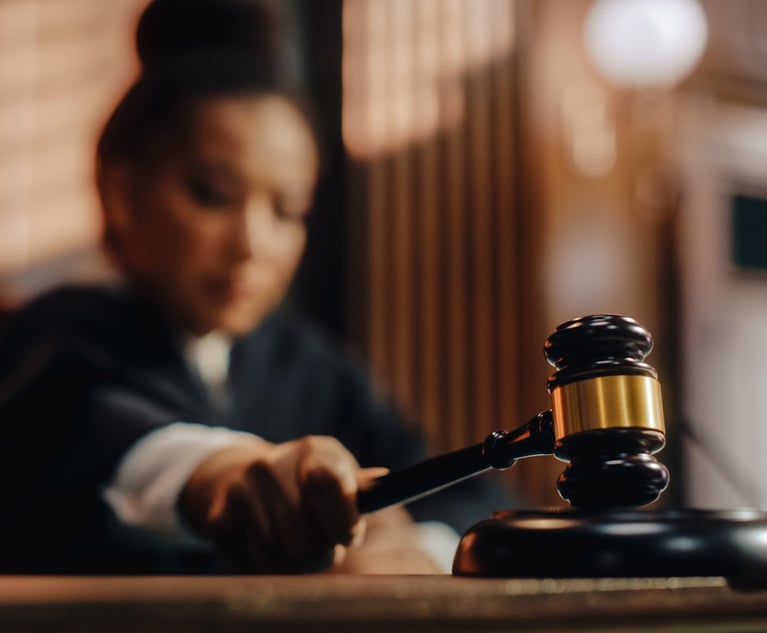'Clash' of Laws Keeps Fight Over Pa. Cannabis Dispensary in Federal Court
The judge said the fight "tee[s] up a fundamental clash between state and federal law."
March 15, 2018 at 04:48 PM
4 minute read
 Photo: Shutterstock
Photo: Shutterstock A dispute between the owners of a Philadelphia shopping mall and a company looking to open a medical marijuana dispensary should not be remanded to state court, a federal judge has ruled, saying the fight “tee[s] up a fundamental clash between state and federal law.”
U.S. District Judge Gene Pratter of the Eastern District of Pennsylvania on Wednesday ruled that the case, PharmaCann Penn v. BV Development Superstition RR, should stay in the Eastern District of Pennsylvania, even though it had initially been filed in state court. The suit seeks court approval to open a cannabis dispensary in the Franklin Mills mall, despite language in the deed barring any stores from using the property for an “unlawful” purpose.
In seeking to have the case handled in state court, PharmaCann contended that the property owners had improperly removed the case and that federal abstention doctrines applied to ensure the case would be heard in state court. Pratter, however, sided with the owners and said the case clearly implicated federal law.
“The deed to PharmaCann's property prohibits 'unlawful' uses,” Prater said. “That single term opens the door for federal jurisdiction by teeing up a fundamental clash between state and federal law in this case.”
According to Pratter, PharmaCann had obtained a permit through Pennsylvania state agencies to operate a cannabis dispensary, and Philadelphia had also granted the company the necessary permits. However, language in the deed specifically barred companies from engaging in “unlawful” uses or from opening “drug stores.”
PharmaCann filed its suit in the Philadelphia Court of Common Pleas in September, seeking a declaratory judgment finding those portions of the deed inapplicable to its business operations. The property owner, Franklin Mills, removed the case to federal court one month later.
PharmaCann contended the removal was improper because two defendants did not consent to the removal, and further argued that the Younger and Burford abstention doctrines applied to keep the case in state court.
Pratter, however, said the two defendants that did not consent to removal had been fraudulently joined, and that neither abstention applied, as the questions were not only locally significant and the federal claim could not be raised in state court.
According to Pratter, even though several states, including Pennsylvania, have legalized certain uses of medical cannabis, the federal Controlled Substances Act “flatly” prohibits distribution of marijuana. This conflict, she said, necessarily raises federal questions of law.
“The need to pursue certainty on the legal status of marijuana dispensaries looms large,” she said.
Pratter added that, not only would a ruling in this case have wide-ranging effects, having the dispute litigated in a federal forum would sidestep any political concerns that might arise from the hot-button issue of legalizing cannabis.
“If the court were to rule that PharmaCann's dispensary violated federal law, the supremacy clause could cast doubt on the validity of dozens of state marijuana schemes,” Pratter said. “Such a ruling, in other words, would require a court to consider the delicate comity between our federal and state systems. The advantages of hearing this kind of federalism-adjacent dispute in a federal forum, free from the pressures of judicial election politics, are obvious.”
Although Pratter noted that her ruling regarding federal jurisdiction has no bearing on the merits of the dispute, she said in a footnote that arguments about the alleged medical benefits of cannabis and the political support behind loosening marijuana laws should not factor into any decision on the underlying claims.
“A word of caution is in order,” she said. “It is not this court's role to second-guess the political wisdom of federal legislation on marijuana.”
Jeremy Unruh, general counsel for PharmaCann, said Pratter's ruling expanded what the company had been asking the courts to determine, and PharmaCann is considering its options regarding a possible appeal.
“Rather than viewing this as a local property dispute, the court sees it as an opportunity to roll up its sleeves and examine the greater federalism question,” Unruh said. ”We're simply asking a state court to determine whether a deed restriction on a 26-year-old deed is still relevant in this day and age.”
James Smith of Blank Rome, who is representing Franklin Mills, said, “Our client is very pleased with the court's decision and is hopeful that this controversy can proceed promptly through the federal court to resolution.”
This content has been archived. It is available through our partners, LexisNexis® and Bloomberg Law.
To view this content, please continue to their sites.
Not a Lexis Subscriber?
Subscribe Now
Not a Bloomberg Law Subscriber?
Subscribe Now
NOT FOR REPRINT
© 2025 ALM Global, LLC, All Rights Reserved. Request academic re-use from www.copyright.com. All other uses, submit a request to [email protected]. For more information visit Asset & Logo Licensing.
You Might Like
View All
People in the News—Jan. 9, 2025—Rawle & Henderson, Armstrong Teasdale
3 minute read


Phila. Court System Pushed to Adapt as Justices Greenlight Changes to Pa.'s Civil Jury Selection Rules
5 minute readTrending Stories
Who Got The Work
Michael G. Bongiorno, Andrew Scott Dulberg and Elizabeth E. Driscoll from Wilmer Cutler Pickering Hale and Dorr have stepped in to represent Symbotic Inc., an A.I.-enabled technology platform that focuses on increasing supply chain efficiency, and other defendants in a pending shareholder derivative lawsuit. The case, filed Oct. 2 in Massachusetts District Court by the Brown Law Firm on behalf of Stephen Austen, accuses certain officers and directors of misleading investors in regard to Symbotic's potential for margin growth by failing to disclose that the company was not equipped to timely deploy its systems or manage expenses through project delays. The case, assigned to U.S. District Judge Nathaniel M. Gorton, is 1:24-cv-12522, Austen v. Cohen et al.
Who Got The Work
Edmund Polubinski and Marie Killmond of Davis Polk & Wardwell have entered appearances for data platform software development company MongoDB and other defendants in a pending shareholder derivative lawsuit. The action, filed Oct. 7 in New York Southern District Court by the Brown Law Firm, accuses the company's directors and/or officers of falsely expressing confidence in the company’s restructuring of its sales incentive plan and downplaying the severity of decreases in its upfront commitments. The case is 1:24-cv-07594, Roy v. Ittycheria et al.
Who Got The Work
Amy O. Bruchs and Kurt F. Ellison of Michael Best & Friedrich have entered appearances for Epic Systems Corp. in a pending employment discrimination lawsuit. The suit was filed Sept. 7 in Wisconsin Western District Court by Levine Eisberner LLC and Siri & Glimstad on behalf of a project manager who claims that he was wrongfully terminated after applying for a religious exemption to the defendant's COVID-19 vaccine mandate. The case, assigned to U.S. Magistrate Judge Anita Marie Boor, is 3:24-cv-00630, Secker, Nathan v. Epic Systems Corporation.
Who Got The Work
David X. Sullivan, Thomas J. Finn and Gregory A. Hall from McCarter & English have entered appearances for Sunrun Installation Services in a pending civil rights lawsuit. The complaint was filed Sept. 4 in Connecticut District Court by attorney Robert M. Berke on behalf of former employee George Edward Steins, who was arrested and charged with employing an unregistered home improvement salesperson. The complaint alleges that had Sunrun informed the Connecticut Department of Consumer Protection that the plaintiff's employment had ended in 2017 and that he no longer held Sunrun's home improvement contractor license, he would not have been hit with charges, which were dismissed in May 2024. The case, assigned to U.S. District Judge Jeffrey A. Meyer, is 3:24-cv-01423, Steins v. Sunrun, Inc. et al.
Who Got The Work
Greenberg Traurig shareholder Joshua L. Raskin has entered an appearance for boohoo.com UK Ltd. in a pending patent infringement lawsuit. The suit, filed Sept. 3 in Texas Eastern District Court by Rozier Hardt McDonough on behalf of Alto Dynamics, asserts five patents related to an online shopping platform. The case, assigned to U.S. District Judge Rodney Gilstrap, is 2:24-cv-00719, Alto Dynamics, LLC v. boohoo.com UK Limited.
Featured Firms
Law Offices of Gary Martin Hays & Associates, P.C.
(470) 294-1674
Law Offices of Mark E. Salomone
(857) 444-6468
Smith & Hassler
(713) 739-1250





